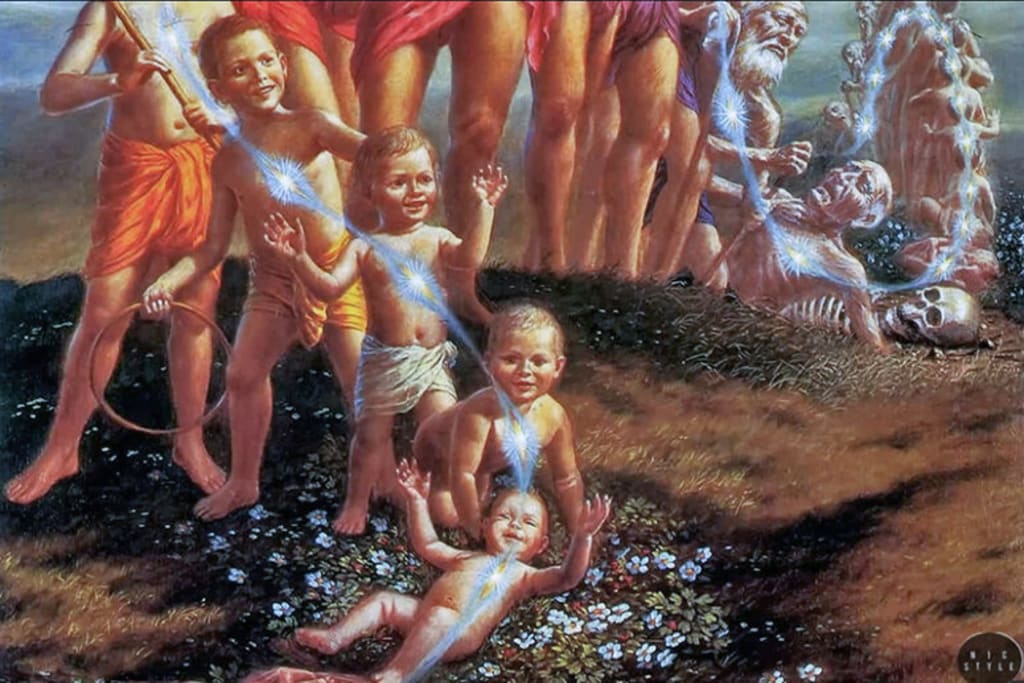Do you believe in Re-incarnation
Do we return when we die

Unraveling the Mysteries of Reincarnation
Throughout history, the concept of reincarnation has captivated human minds, transcending cultures and religions. This fascinating belief suggests that after death, the soul is reborn into a new body, continuing its journey through multiple lifetimes. While reincarnation remains a subject of debate and speculation, it has influenced spiritual practices and philosophical discourse worldwide. In this article, we will delve into the concept of reincarnation, exploring its origins, significance, and the various perspectives surrounding it.
Origins and Cultural Significance
Reincarnation is not tied to a single culture or religion; rather, it emerges independently in various civilizations throughout history. The ancient Indian religions, such as Hinduism and Jainism, prominently feature the concept of rebirth. Hinduism's belief in karma, the law of cause and effect, suggests that one's actions in previous lives shape their current existence. Buddhism, an offshoot of Hinduism, also embraces the idea of reincarnation, considering it a fundamental aspect of the cycle of life and death.
Beyond the Indian subcontinent, reincarnation appears in other religious traditions as well. The ancient Egyptians held a belief in an afterlife journey known as the "Weighing of the Heart," where the deceased's soul would undergo judgment before being reborn. Greek philosopher Pythagoras and his followers advocated for reincarnation, believing that the soul transmigrated from one body to another. Even in contemporary times, reincarnation plays a significant role in certain sects of modern spirituality and New Age philosophies.
Exploring the Belief
At the core of reincarnation lies the idea that the soul is eternal and separate from the physical body. When a person dies, their soul enters a new body, either human or non-human, to continue its spiritual growth. Proponents of reincarnation argue that this belief provides a profound sense of purpose and continuity, emphasizing personal responsibility for one's actions and moral development across lifetimes.
Many individuals claim to have memories or experiences that they attribute to past lives. These accounts often involve detailed recollections of specific events, places, or people from a time period in which they could not have lived in their current lifetime. While skeptics view such claims as products of imagination or false memories, proponents argue that these experiences provide evidence for the existence of past lives and the cycle of reincarnation.
Karma and Reincarnation
One of the fundamental concepts intertwined with reincarnation is karma, the notion that every action has consequences that shape future experiences. According to the law of karma, the moral choices made in one life have repercussions in subsequent lives. Positive actions lead to positive outcomes, while negative actions result in negative consequences.
The interplay between karma and reincarnation offers a sense of justice and balance in the world. Those who have endured suffering in one life may find solace in the belief that their next incarnation will provide opportunities for growth and improvement. The cycle of birth, death, and rebirth thus becomes a mechanism for spiritual evolution and the eventual attainment of liberation or enlightenment.
Challenging Perspectives and Scientific Skepticism
While reincarnation continues to inspire spiritual and philosophical exploration, it also faces scrutiny from a scientific standpoint. Critics argue that the lack of empirical evidence and the presence of alternative explanations undermine the credibility of reincarnation as a phenomenon. Skeptics propose that apparent memories of past lives may stem from psychological factors like suggestibility, confabulation, or cultural influences.
Scientific investigations into reincarnation, such as the work of psychiatrist Dr. Ian Stevenson, have aimed to provide objective evidence for past-life memories. However, despite numerous intriguing case studies, the scientific community remains divided on the subject, with skepticism prevailing due to methodologic.
Dr. Semkiw's Studies on Reincarnation: Exploring the Continuity of Consciousness
Reincarnation, the belief in the rebirth of a soul into a new body after death, has fascinated and intrigued cultures throughout history. While it remains a subject of debate and skepticism, Dr. Walter Semkiw has dedicated his life to researching and documenting evidence supporting the concept of reincarnation. Through his studies and extensive research, Dr. Semkiw has made significant contributions to the field, shedding light on the potential continuity of consciousness across lifetimes. In this article, we will explore Dr. Semkiw's work and its implications for our understanding of human existence.
The Life and Background of Dr. Walter Semkiw
Dr. Walter Semkiw is a highly regarded reincarnation researcher, board-certified psychiatrist, and advocate for past-life therapy. His journey into the field began when he came across the case of a young boy named James Leininger, who exhibited detailed knowledge of a World War II pilot's life, even though he had no previous exposure to that information. This encounter sparked Dr. Semkiw's interest in reincarnation, leading him to investigate similar cases worldwide.
Reincarnation Research and Case Studies
Dr. Semkiw's research focuses on identifying past life matches through facial and physical resemblance, personality traits, talents, and behavior patterns. He utilizes historical documentation, including photographs and written records, to establish connections between current individuals and their purported past lives.
One of the notable cases Dr. Semkiw has examined is that of Barbro Karlen, a Swedish woman who claims to have been the renowned French writer and philosopher Voltaire in a previous life. Through her vivid recollections and uncanny knowledge of Voltaire's life, Dr. Semkiw presents compelling evidence supporting her assertions.
Another intriguing case is that of James Huston Jr., who tragically died during World War II. Years later, James Leininger was born, and from an early age, he displayed an incredible affinity for aviation and an extensive knowledge of military aircraft, even though his parents had no military background. Dr. Semkiw's research points to James Leininger being the reincarnation of James Huston Jr., highlighting the continuity of consciousness between lives.
Reincarnation and Science
Critics often challenge the concept of reincarnation, dismissing it as a mere superstition or religious belief. However, Dr. Semkiw emphasizes the importance of approaching reincarnation from a scientific standpoint. His work aims to bridge the gap between spirituality and science, providing empirical evidence to support the existence of reincarnation.
One of the methods used in Dr. Semkiw's research is the comparison of facial features between individuals in their alleged past and present lives. By examining photographs, he highlights striking resemblances that go beyond mere coincidence, supporting the idea that consciousness may transcend physical death.
Furthermore, Dr. Semkiw advocates for genetic memory as a possible explanation for the transfer of personality traits and talents across lifetimes. This concept suggests that certain traits and abilities can be imprinted in the genetic code and carried forward into subsequent lives.
Implications and Controversies
Dr. Semkiw's research challenges conventional beliefs about death and the nature of consciousness. If consciousness indeed continues after death and manifests in new bodies, it raises profound questions about the purpose of life, the nature of identity, and the potential for personal growth across lifetimes.
Naturally, the topic of reincarnation is not without controversies. Skeptics argue that the evidence presented by Dr. Semkiw and others can be attributed to coincidence, false memories, or subjective interpretations. The scientific community, in general, remains cautious in accepting the idea of reincarnation due to the lack of conclusive empirical evidence.
Dr. Walter Semkiw.Is the president and editor of Reincarnation Research. The pioneer in reincarnation research.He has compiled 1500 cases involving young children who had past lives memories. His cases suggest. that reincarnation is a valid phenomenon.
He travelled around the world, studying young children with spontaneous memories of past lives for over 40 years. From these cases he was able to write about reincarnation. People have the same personalities and talents. and can look exactly like they did. in their past incarnations, that is one of the patterns. Anne Frank died and Barbro was born nine years later.
When Barbro was a little child she once said that her name was Anne Frank. She had memories of her life as Anne Frank. The Diary of Anne Frank was not yet published, and her parents had no idea who Anne Frank was., and they thought she was making this all up. Her case was very compelling in not only that she has the same facial features as Anne Frank, but she had memories from childhood Her parents took her to
Amsterdam by the time she was ten.Brabro s father wanted to go and see the Anne Frank museum and Brabro said “We do not need a cab the museum is right near here” They were surprised how she could possibly know that as she had never. been to Amsterdam.
Somehow Barbro went straight to the Anne Frank House, looked at a wall and said, "Mommy, look the pictures of movie stars and they are. are still on the wall." And her mother looked at the wall and said, "Barbro, there's nothing there." A tour guide then interjected and spoke.
"Actually, the pictures that Anne Frank had clipped out magazines of movie stars had been on that wall." At this very moment her parents realized that her past life memories were real, and that her reported memories were not fantasies.
And Barbro became a childhood writing prodigy, just like Anne Frank. She published her first book at age 12.





Comments
There are no comments for this story
Be the first to respond and start the conversation.